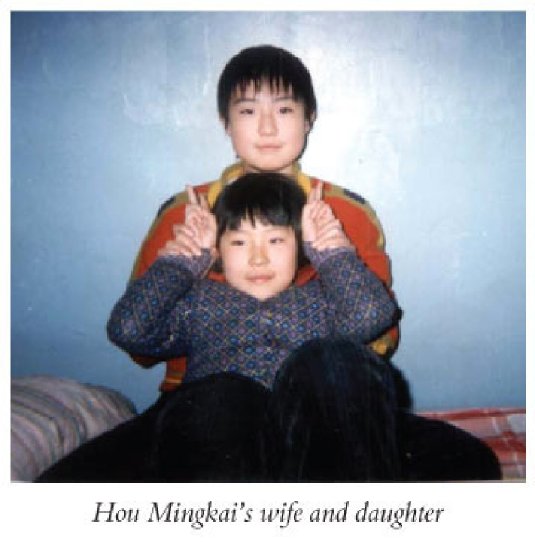Into Thin Airwaves
22 min read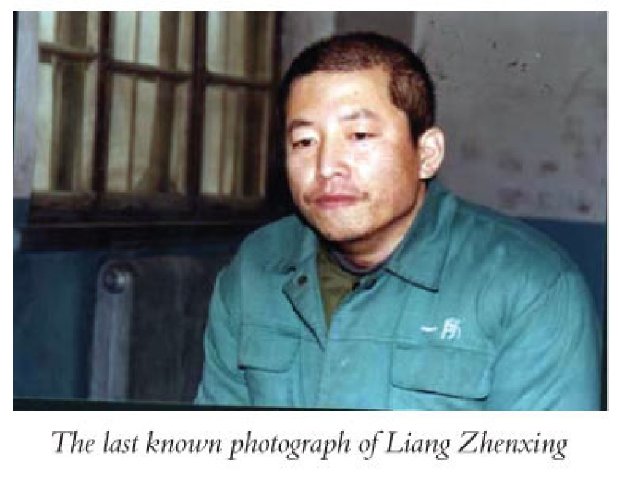
How a handful of unknown Chinese martyrs aided the cause of freedom around the world
By Ethan Gutmann
Back in January 2010, Secretary of State Clinton gave a pay-any-price, bear-any-burden address calling for the liberation of the global Internet. The price Washington was willing to pay? It promised $50 million to groups developing “new tools that enable citizens to exercise their rights of free expression by circumventing politically motivated censorship.” The burden it would have to bear? The only group that has actually pulled this off is named Falun Gong.
Now, it is a fact that if you ever have the desire to see a Chinese administrator do a squirmy, unpleasant little dance, you have only to mention the name of that officially despised Buddhist revival group. But it is also a fact that the State Department reads the New York Times, which credited the Global Internet Freedom Consortium—essentially a group of Falun Gong computer engineers—with the creation of revolutionary web systems that not only have enabled millions of Chinese citizens to surf beyond the Great Firewall, but also provided the platform for the vast majority of the citizen reportage that reached the West during the aborted Green Revolution in Iran. By May, the State Department, breaking a Washington taboo against sustained contact with Falun Gong, was reportedly ready to offer $1.5 million to the Global Internet Freedom Consortium.
Miraculously, for once, the squirmy dance hadn’t had its full intended effect. And for some Falun Gong practitioners, the timing seemed to carry a touch of divine justice, if not an outright Hollywood ending. For just days before the Washington Post reported the State Department’s decision, in early May 2010, the man whose ingenuity had spurred the group’s work on Internet freedom died in China.
All movements—even pocket-protector ones—have their legends and their origin myths, often set in an older, simpler place and time, as is this one. But although he never won a Nobel Prize, the man who died was real. And in 2002, when China experts in the West universally judged that his cause was a failure, he commanded the most successful Falun Gong action ever undertaken on Chinese soil—the hijacking of a massive city’s television signals for nearly an hour. Pulled off by a small gang with minimal experience or resources, the operation was strikingly uncharacteristic of Falun Gong at the time, but from it would grow far more sophisticated challenges to Chinese Communist party control over information in the years to come. Television hubs would become Internet routers, guerrillas would be replaced by geeks, infocops and robbers would go virtual, and the brawl would spill out from China into Atlanta, Tehran, and the State Department. But it all started in the city of Changchun with a man named Liang Zhenxing.
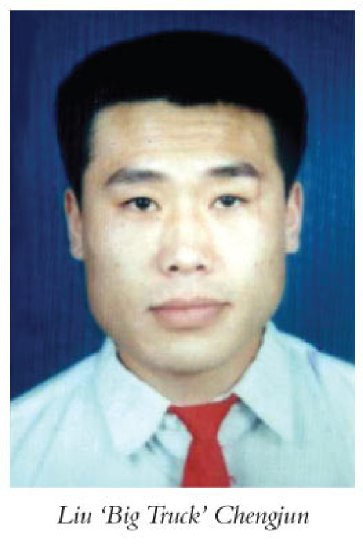
photograph of Liang—probably taken in mid-March 2002—his jaw is set, and his eyes seem fixed on some point outside the interrogation room. Connecting the dots—the six head-level stains on the wall—some observers detect a trace of blood on Liang’s left temple. Either way, Liang’s posture speaks clearly enough: His run is through.
Liang could hardly have assumed that Westerners would see the picture. The Chinese police briefly published it online as a trophy—and a warning to the Chinese people—confident that no Western media outlet would bother to publish anything substantial on one more captive Falun Gong practitioner. Liang endured for eight more years, but he ultimately died in Chinese police custody on May 1, 2010, in Gongzhuling’s Central Hospital. The cause of death was routine by Falun Gong standards: inexorable physical deterioration from beatings, electric shock, sleep deprivation, force-feeding. Under the strain, Liang may have accelerated things by throwing himself down a stairwell during a prison transfer, suffering a cerebral hemorrhage. In historical terms, Liang may have had an incredible run, but by the end he could no longer speak.
Falun Gong sources such as Minghui, the internal web-based Falun Gong spiritual samizdat, reported his demise, but no extraordinary efforts were made to promote his obituary. Perhaps there was an unconscious reluctance there; Liang’s actions were still controversial. And Liang himself had always been an outlier practitioner—a heartland Horatio Alger, a real-estate player, a mover and a schmoozer and a playboy, giving his sudden conversion to Falun Gong a cross-and-switchblade veneer. In short, Liang was a product of Changchun. Changchun lies in the center of Northeast China. And in the center of the city, just south of Victory Park and north of Liberation Road, lies the concrete-tiled expanse of Changchun City Cultural Square. Below the faux-soaring modernist arch, a cast iron socialist-realist muscleman throws up his arms in triumph, or perhaps despair. Few Westerners see him; foreigners seldom sightsee or invest in this city of more than seven million. Yet just as there is a certain gritty security in Changchun’s role as a “pillar industry” town—the cradle of the state-owned Chinese automotive industry—there’s a certain native freedom in not having to perform for outsiders either. For Cultural Square, in all other respects a monument to the ascendancy of the New China, also served as the birthplace of Falun Gong.
It was there in 1992 that one Li Hongzhi, who lived a few blocks away in a rundown apartment block, chose a neglected leafy corner and began teaching meditative exercises to anyone who was interested. In the wake of the 1980s qigong exercise craze, there was nothing about this to catch the eye of the authorities, particularly as money didn’t seem to be changing hands. But something about Li inspired unshakable loyalty among his first students, and underneath the baby-faced appearance of the man and the apparent simplicity of the movements lay a deep coding: a hardcore Buddhist morality system of compassion, truthfulness, and forbearance. The novel twist was that these moral precepts were to be carried out in Changchun, rather than a monastery. And Li didn’t attract a narrow market segment, like most qigong spiritual masters, but individuals from all walks of life: old ladies and young soldiers, wealthy industrialists and illiterate unemployed wanderers from rural villages. As their numbers grew, they moved out from the leafy corner. Liang Zhenxing lived a block away, just across Liberation Road, in comfortable housing. Sometimes, in the half-light of an early winter morning, he would watch the masses of down coats and mittens hypnotically swaying in unison, right below the naked muscleman, while frigid winds whipped trash across the square. One cold morning in 1996, Liang woke up, threw on his coat, and walked over. Initially, the practitioners were nervous about Liang: his paunch (his full-lotus was considered comical), his brash way of speaking, and his skeptical wife. But within a month Liang started bringing in recruits: family, real-estate contacts, intellectuals he met in the park, and working guys he met in dark clubs. Whatever passed for a hierarchy within Falun Gong quickly agreed to make Liang a coordinator, free to teach the exercises and run his own study group. Some practitioners whispered that Liang hadn’t read enough or didn’t have experience, but he was immune to gossip; he told a friend the great thing about Falun Gong is that after three months you don’t care about power anymore.
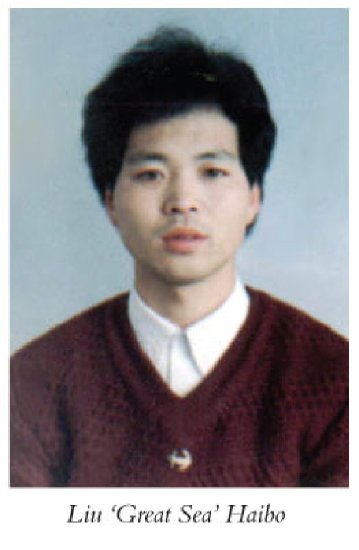
Yet in the eyes of the party, even the desire not to have power, if shared by enough people, becomes dark matter— a hidden gravitational force that pulls state enemies and party members alike into its orbit. So a few years on, when Chinese internal intelligence revealed that Falun Gong had reached 70 million followers, 5 million more than party membership, traps were laid. Plainclothes agents appeared at practice sites, critiques were planted in state papers, and silent makeshift demonstrations were documented and interpreted as treason. On July 20, 1999, the arrests began in Beijing. Three days later, as the sun rose over Changchun’s Cultural Square, Liang looked out. Only policemen stood beneath the triumphant muscleman.
Two months later, Liang made the acquaintance of his first interrogation room. Many Changchun practitioners had been there by now. Liang had held back from public action, reasoning the Master Li legacy meant Changchun security was abnormally high. Instead, Liang and a hundred other practitioners planned to go to the Beijing appeals office—the only legally permissible action available to a Chinese citizen—on October 1, National Day. Such a large group was easily infiltrated, and the police rounded them up before they boarded the train.
In detention, Liang refused to damage the cause by signing a public condemnation of Falun Gong or informing on his co-conspirators. The police responded by instructing the drug addicts and criminals to play tedious power games (Please may I eat? Please may I scratch? Please may I use the toilet?), where the practitioner, dedicated to compassion and nonviolence, becomes a hapless object of amusement and torture. Most practitioners quietly endured, believing that humiliation and pain have spiritual value. They hoarded indignities like money in the bank. Liang hated this, so when the criminals told the practitioners to shout party slogans as they marched in the courtyard, Liang said he wouldn’t shout anything and took the beatings. Yet what really pained Liang was that no practitioners joined his mini-rebellion. He analyzed his failings: He had the will, yet he couldn’t quite articulate why his resistance mattered. Still flabby in spite of his hunger strike, he didn’t inspire physical courage. But Liang had heard of someone who did.
Liu Chengjun was a practitioner from a small town in Jilin Province not far from Changchun. As a stockroom clerk, he was just another migrant worker in the big city, but he had access to a truck. Liu’s response to the Falun Gong crackdown was to load his truck with “truth-clarification” pamphlets and drive them up highway 302 to his home in Nong’an and the surrounding villages, which, as a country boy, he knew well. That, and the fact that he was unusually large, strong, and even-featured, won him the nickname “Big Truck.”
Like Liang, Big Truck didn’t go along with the prison games. But he went further; other practitioners would get their legs kicked out from under them if they moved a muscle during roll call, but Big Truck would casually stroll over to the nine-foot wall of the detention compound. Confronted, he didn’t raise his hand or bare his teeth. He didn’t need to; the frank stare and unyielding posture, like a warrior in a Beijing Opera, warned the guards of untold consequences if they dared to touch him. The guards developed myths: Big Truck was connected; Big Truck ate pork buns in a single bite; Big Truck was a go-to guy for organized crime. One chilly morning in late October, as everyone slept, Big Truck got up, leapt to the edge of the wall, and pulled himself up and over. The guards retroactively claimed they had released Big Truck, but when Liang heard about the escape, a thought flashed across his mind: He had found his general.
Nine months later, on July 12, 2000, Liang was transferred to a Fengjun labor camp cell shared by Big Truck (already back in prison) and a skinny little guy with glittering eyes who never seemed to shut up. Big Truck whispered to Liang that little smart-smart was a radiologist from Chuncheng Hospital, Changchun. His name was Liu Haibo, but everyone called him “Great Sea,” both as a play on his Chinese name and because of his uncanny ability to memorize swaths of Master Li’s writings in a single night, a data retrieval system that could seemingly have other applications. Liang was initially unimpressed with Great Sea’s story: Changchun practitioner ’96, two arrests, two Falun Gong renunciations, two rejections of his renunciations, never met his newborn son, Tianchun, and so on. Yet there was one incident that stood out. Shortly after the crackdown, some party apparatchik had put up an exhibition of Falun Gong “atrocities” at a Changchun elementary school. Liang knew of it; Liang knew of it; the authorities’ forcing children to see practitioner “suicides”—hanging from nooses or with their guts hacked out—had turned like a knife in his own stomach. But don’t worry, the exhibition is gone now, Great Sea said. Great Sea related that he had walked in, ripped the posters down, and thrown them away. They were poison, Great Sea said, without a trace of anger or drama. Liang realized that Great Sea was that rarest of birds in China: a scholar without fear.
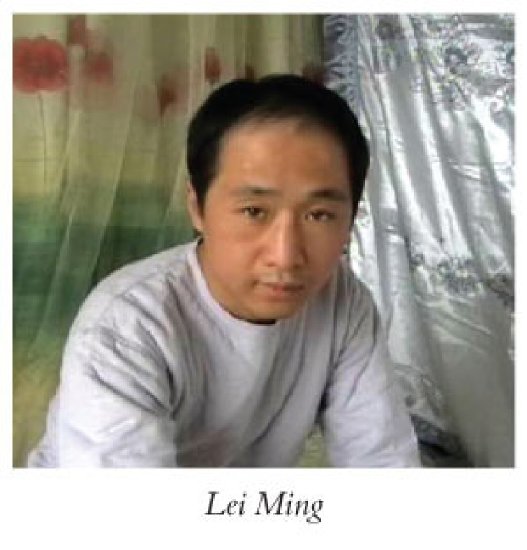
They were an odd trio, Great Sea, Big Truck, and Liang, and initially they had no plans, no journey to the West. Instead, larger events would conspire to bind them together on their personal pilgrimage. From 2000 to 2001, practitioners—perhaps 150,000 or more—had gone to Tiananmen Square to protest the Falun Gong ban. It
hadn’t been effective; they wafted in about 500 a day, gustLiu ‘Great Sea’ Haibo
December 6, 2010 The Weekly Standard / 19 ing up to 4,000 or so on special occasions. Even then, they unfurled their yellow banners according to some internal conscience-clock rather than a preconceived strategy and were easy pickings for the security forces. But Tiananmen had given practitioners a focal point, a commonly
respected means of sincere expression that dated back to imperial China. Indeed, the Chinese public had never been persuaded by the party’s campaign. The more strident media reports on Falun Gong—a dangerous cult, Li Hongzhi is like Hitler, participants will kill themselves or their parents—simply led most Chinese to silently wonder: Why is the party so deeply threatened? Why don’t they leave those people alone?
On the afternoon of January 23, 2001, five protesters, including a mother and a daughter, walked onto Tiananmen, doused their bodies with gasoline, and set themselves on fire. The footage played for weeks, and public disgust was real. Any remaining inhibitions about fair treatment for incarcerated practitioners were replaced by death quotas and mass disappearances to military hospitals. Falun Gong was finally being erased.
Incarcerated in Changchun’s Chaoyang Gou prison, Liang’s gang discussed the gaping holes in the immolation story: Crucially, Falun Gong teachings decried suicide. Plus there were rumors that CNN hadn’t provided the footage as the authorities claimed. Brushing aside the strange camera angles and inexplicable police behavior, Great Sea recalled a story translated from the Washington Post: A reporter had traveled to the burning mother’s home town only to discover the self-immolator was not a practitioner, but a paid nightclub dancer, that is, a prostitute.
They had all used “truth-clarification” techniques: Liang liked tapes and remote loudspeakers, Big Truck swore by his mountains of pamphlets, Great Sea favored slogan-balloons. All seemed faintly ridiculous now. Yet an article on “broadcast interruption” in Minghui had caught Liang’s eye while in detention. The article spoke
of the theoretical possibility of intercepting television transmissions by climbing up telephone poles, splicing into wires, and connecting DVD players. No specifics, but Great Sea’s experience in radiology gave him some purchase on the electronics, while Big Truck worked on getting back into shape.
At the end of 2001, Liang’s gang stopped hunger-striking and adopted a cooperative attitude. They were soon released. Immediately they began assessing transmission lines throughout Changchun. It seemed impossible at first—just a series of lines running in every direction. But Liang’s familiarity with Changchun’s geography kicked in, and he noticed that each neighborhood appeared to have a box. Tracing the wires, he wondered if each box was an electronic hub. Big Truck scaled a conveniently placed wall and confirmed it. Yet even if they could map the system, there were many hubs, only three pairs of hands, and walking around craning their necks heavenward had already attracted curiosity, never mind climbing a wall (even Big Truck was afraid to climb a pole). They began sniffing around Changchun for young, athletic practitioners who were prepared to risk
their lives.
Liang found three. The first was a 26-year-old named Lei Ming, the little brother of the gang. Changchun at this
time was a hotbed of Falun Gong activity; practically every street had a Falun Gong cell involved in making pamphlets or video-discs or banners. Lei had drifted in from Jilin City, with his black leather jacket, black shoes, black pants, and a couple of T-shirts. Previously a short order cook of northern cold dishes like pig knuckles, he was remarkably good with his hands, and he wore a perpetually self-humoring look that could morph into a strangely ominous stare if a stranger showed undue interest. Most of all, Lei was perfectly fit, in part because he’d spent less time rotting in cells than the others. After he unfurled his banner in Tiananmen, he had outrun an entire phalanx of cops, ultimately losing them in the nearby hutongs, the spider-web alleyways of Beijing.
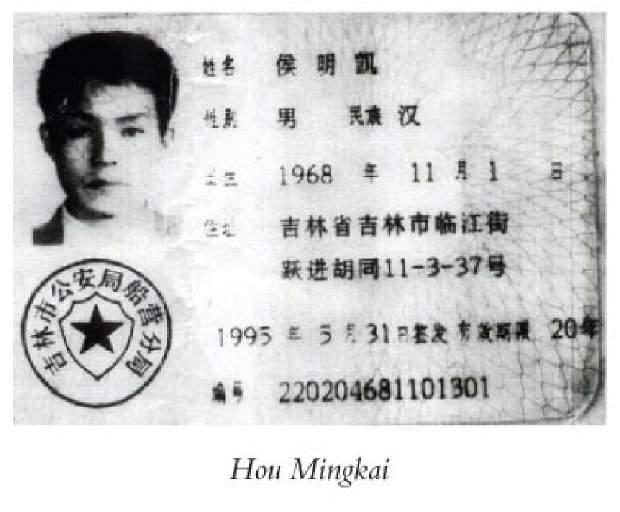
The second recruit was a 32-year-old named Hou Mingkai. Unlike the others, he was selected by a local coordinator because of his electrical acumen, his extraordinary fitness, his proven ability to withstand torture, and his charisma. For his part, if Hou felt any misgivings about leaving his lovely wife and daughter to go to the mattresses with Liang, he masked it by playing the court jester—or, in Chinese terms, the monkey. He had learned how to hustle at the foot of his parents’ fried dough-stick stand—the entire city knew they were “long and tasty.” Now Hou’s absurd impersonations of interactions with police and peasant bystanders as he craned his neck to map the transmission lines (Dude, a storm is coming. Seen my pigeon? Man, what a crap massage) even had Big Truck cracking up.
Finally, there was Zhou Runjun, who came in as the group’s cook. Zhou also excelled at one other essential
Chinese feminine activity: nagging and pestering. Great Sea always wanted to talk, theorize, and hold meetings,
but Zhou would storm in from the kitchen snarling that they were all just too chicken to climb. One morning she
walked in with a bundle of lineman hooks, twisted a pair onto her boots, and scaled the pole in the backyard, screeching at them as she went. Rather than listen to Zhou call them sissies all day, they followed her example. By evening, even Liang had done it once.
They were getting close now. During the day, they would practice on an abandoned hub pulled out of the junkyard. By night, they would scale poles in strange neighborhoods, always in pairs, with Big Truck, Lei, or Hou scrambling to understand the hub configuration while Great Sea, Liang, or Zhou distracted the neighborhood watch—the old women wearing red armbands.
On the night of February 16, 2002, Liang received word that some television screens in the steel town of Anshan, a five-hour drive southwest of Changchun, had briefly flickered, gone black, and been replaced with a Falun Gong spokesman clarifying the self-immolation. It was only on cable and it hadn’t lasted—a practitioner had been shot or a wire had short-circuited, but it could be done, and the police would know that too. The rehearsal schedule would have to be cut short; Liang designated the evening of March 5 as zero hour, following the kickoff of the National Party Congress, the Chinese state’s equivalent of Holy Week. While they feverishly mapped the lines, Liang faced a rearguard action. Liang kept his cell small, enforcing a no-talk zone with the practitioner community, but word had spread. Even if Liang’s plan didn’t involve taking over television stations with guns (as rumor briefly had it), most Changchun practitioners were dead set against the hijacking.
Cutting wires was illegal, and people would hate Falun Gong even more if they missed their favorite show—yet it
all came down to the practitioners’ belief that it was purity of motive that counted, not worldly results (a logic that
had led to millions of practitioners’ arrests throughout China). Liang’s plan sounded suspiciously like organized
political action. Hadn’t Master Li said that practitioners shouldn’t get involved in politics? Chinese politics was a
filthy business—lies, murders, graft, and karaoke bars. By that standard, Falun Gong was pure as white snow—the red blood of the martyrs only highlighted its radiance.
Tang Feng, a tall and stately Changchun practitioner who commanded universal respect for his convictions, was sent to Liang’s hideout to talk them out of it. Liang listened carefully. Then Liang pounced: The Tiananmen get-your-spiritual-card-punched approach is finished—permanently contaminated by the self-immolation. So stop begging the party for mercy and go directly to the people. How people position themselves between Falun Gong and the party will determine their spiritual fates, right? Maybe the people are even with us, but not without the facts. Should only Anshan receive the facts? What about Changchun? There will never be another chance, Liang said. Following the meeting, Tang Feng quietly informed the other practitioners that he had failed to talk Liang out of it. Actually, he would join the hijackers himself, Tang said, but his skills were better employed writing about these events for Minghui. Perhaps everyone should be more discreet about Liang’s operation from now on.
On March 1, Liang was woken up by a real-estate buddy asking him to sort some papers ASAP. Liang appeared at his former office an hour later and was suddenly surrounded by police. They drove him back to the now-familiar interrogation room. That night the gang ate Zhou’s dinner waiting for the policemen’s knock on the door. It never came, so they went out mapping. Great Sea and Hou had finally cracked a method of splicing wires in advance, so only a last-minute adjustment would be needed. Over the next three nights they would transform every hub into a truth time-bomb. Using bicycles and cabs, within 15 minutes, they could launch across Changchun simultaneously. But it came down to the interrogation room. Maybe the police knew nothing of the hijacking plan. But they would torture Liang for names, activities, and locations. Somehow, Liang had to hold on.
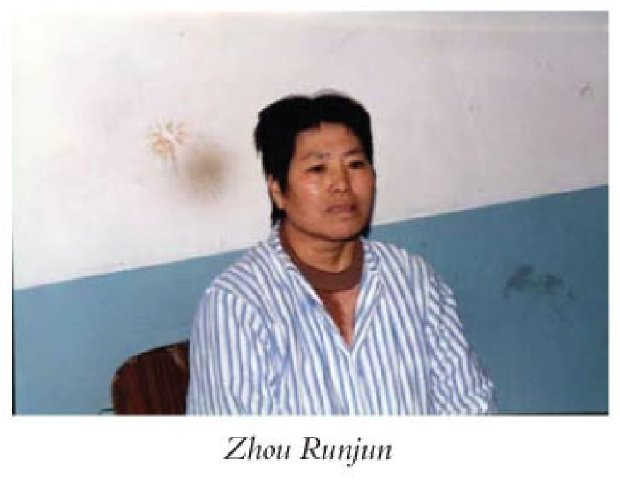
Four nights later, Tang Feng went into a convenience store at a big intersection near People’s Square. People
Zhou Runjun December 6, 2010 The Weekly Standard / 21 were standing around watching TV, but with a curiously hunched, agitated posture. Tang looked up. A television program was wrapping up, a sort of bearded Chinese Goldstein calling the self-immolation at Tiananmen Square a “false fire,” a lie, and a criminal propaganda campaign by President Jiang Zemin. Then a new program showed vast parades of yellow silk passing under the Eiffel Tower, past Big Ben and the U.S. Capitol, explaining how Falun Gong had spread around the world and is welcomed in other countries. What happened to the TV?, a man asked.
Maybe a neighbor is watching a video and the store is somehow picking up the signal, the owner replied, flipping through the channels. They were all showing the same program. A few people started speculating that an antiJiang faction had taken over the state.
Tang watched with them, feeding off their excitement, his eyes welling up, a lump growing in his throat: Liang had held on. Now people could finally know the truth about Falun Gong. They could learn about how Falun Gong is treated in foreign countries. Their eyes are wide open. Then the screen went dark, and there was no signal. After a while, Tang knew there would be no more. They must have been discovered. As he walked home, far in the distance, almost imperceptible, Tang thought he heard shouts coming from the direction of Cultural Square.
The Falun Gong broadcast had played on eight channels for 50 minutes, garnering an audience of over one million people, the ratings building as word spread, people calling each other, saying they should turn on their TV immediately. In some neighborhoods, local party officials grew desperate and cut the power, plunging streets into darkness. In others, such as those near Cultural Square, people spilled into the streets to celebrate. The ban is over Falun Gong is rehabilitated
A few practitioners emerged from factories and hideouts, openly handing out literature. Neighbors, children, random strangers, even the old ladies with the red armbands approached them, everyone talking at once, bubbling over, laughing, slapping them playfully, congratulating them. A few suspected it had not been a government broadcast, but still they smiled broadly and whispered: How did you do it? You Falun Gong are so amazing And it was almost beginning to seem as if they had been rehabilitated after all, and the euphoria and laughter did not cease, not even at 10 p.m., when the first practitioner got a phone call from a military friend saying they had orders to round up Falun Gong.
Now we’re getting to the part in the story that’s a bit more difficult. The ascent of the mountain, the view from the top, are interesting, perhaps even inspiring; the descent, the transformation of individuals into howling animals, less so. Yet far more detailed testimony exists about the latter events, because—understandably or perversely,
depending on your perspective—it is intensely important to practitioners. Several were even present—for example, tied to a heating pipe—to witness the moment of death. It’s best to summarize.
Lei Ming, the little brother of the gang, was captured at 10 p.m. on March 5. Over the four days that he was bound to an iron chair, he may or may not have informed on his colleagues. Lei was ultimately released early and died of meticulously documented spinal injuries on August 6, 2006. It’s unclear whether Jiang Zemin actually gave an order to “kill [Falun Gong] without mercy.” Yet there is far less debate over whether the Jilin City head of the 6-10 Office, the agency created to eliminate Falun Gong, said: “This time we will tear their skin off.” It is a fact that Changchun and Jilin City officials were warned that they would lose their jobs if another hijacking occurred, plainclothes police were mobilized to stand by television transmission poles throughout Changchun, Western television reporters were ordered not to film any Chinese television broadcasts, and the police
rounded up between 2,000 and 5,000 Changchun practitioners while Lei was tied to the iron chair.
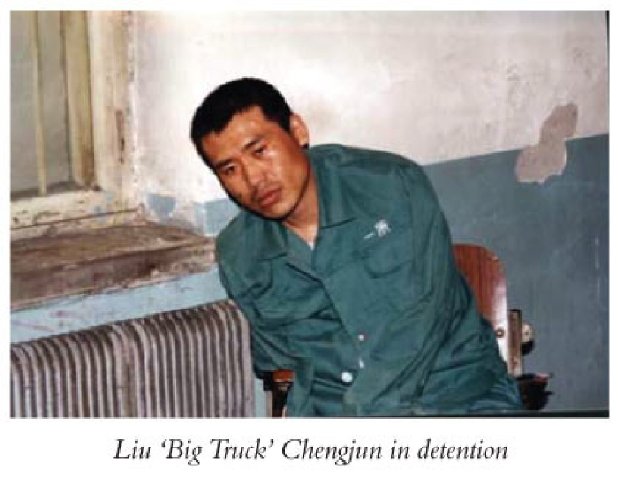
On the evening of March 9, Great Sea was arrested in his home along with Tang Feng. The police trussed Great Sea to his living room chair, and broke his ankle in front of his wife and his then two-year-old son. Transferred to the Central Changchun police station in the early hours of March 10, Great Sea was stripped and a policeman named Huo, now living in the United States, observed two police staff members forcing a high voltage electric baton into Great Sea’s rectum. A few minutes later, the policemen began calling around the station that Liu Haibo’s heart had stopped. Great Sea was officially pronounced dead at the Changchun Central Hospital.
In the late evening of March 24, over 60 police officers surrounded a wood pile that Big Truck—always the country boy—employed as his hide-out. The police officers soaked the pile with gas, lit it, and when Big Truck emerged, shot him twice in the thigh. Driving Big Truck to the station, the police van overturned, possibly as a
result of a struggle. A police photograph taken shortly afterward shows that Big Truck could no longer sit vertically. A shirt is partially draped over him, suggesting that his arms are broken. Soon after, Big Truck spurned a China Central Television crew attempt at an interview. From that point on he was seen being carried between
incarceration centers by stretcher.
Big Truck was ultimately sentenced to 19 years in the No. 2 Prison in Jilin City, but he died of injuries with his family present on Boxing Day 2003.
On September 20, 2002, the Changchun Intermediary People’s Court sentenced Zhou Runjun to 20 years in prison. It is believed that she died in labor camp.
Hou Mingkai was the last to be caught. Having escaped to neighboring Jilin City, Hou attempted to repeat the hijackings. Failing, he stayed true to his monkey persona by climbing a tree and placing loudspeakers denouncing Jiang Zemin within the public security bureau compound. A bounty of 50,000 yuan was placed on his head.
On August 21, Hou was arrested in Changchun, taken to Qingming police station, and beaten to death by 4 a.m.
the following morning. The police officers then held an impromptu celebratory meal. It’s unclear whether the dough-sticks were particularly long and tasty, but the circumstances suggest they may have been purchased at the Hou family stand.
The hijacking and its bloody aftermath galvanized a wave of copycat attempts, most of them failures, a few wildly successful. But it was a one-trick pony. The Changchun effect would never be repeated; with the publicity surrounding the hijackers’ arrests, no one would ever believe again that Falun Gong had been rehabilitated. But no one would ever quite believe the government’s version of the Tiananmen self-immolation either. Changchun turned certain checkmate into perpetual check, but there was no international chess federation, or none that cared, anyway, to enforce the draw.
It took Chinese practitioners in the West—elite, highly educated, cool—to realize that Chinese television, and indeed propaganda and counterpropaganda, were mere foothills. The mountain had moved. With names like FreeGate, UltraSurf, and Dynaweb, small cells of practitioners, operating out of offices in northern California and living rooms in North Carolina, began the process of climbing over the great Chinese firewall and forging a permanent Internet connection to China from the West.
In 2006, as it became clear that Falun Gong was no longer playing for stalemate, the North American systems administrator of Falun Gong was rolled into a carpet, beaten, and left bleeding in his suburban Atlanta home by Chinese hit men. That same year, practitioners formed the Global Internet Freedom Consortium. A few years later they posted an intro page written in Farsi and—well, you know the rest.
Did Liang understand what he had wrought? It’s far from clear that he was told any of this, or even that he would have understood the full implications had anyone told him. Whenever he was allowed fleeting contact with a practitioner, he always asked, in hushed tones: Had the hijackers’ story made it into Minghui? Did they know?
Yes, the practitioners know. But the story hasn’t worked out quite as some had hoped. After Liang’s death, the State Department balked at actually funding his Internet successors. Instead, Internews, essentially a media-training NGO, and the well-established research organization Freedom House got most of the money; thus were rewarded the dual principles of political safety and utter irrelevance to the task at hand. It’s even possible that the State Department’s original stated goal of liberating the Chinese Internet was just a feint to try to get the Chinese to negotiate an end to their own serial hacking attacks on systems in the West. But Falun
Gong’s howling commandos didn’t die for Western network security.
So the Hollywood ending is canceled at this time for lack of investment. Yet the story may not be quite over. We
had an election. The new House leadership claims to be principled. There is a chance they will find their way to
the mountain. Perhaps someday they will even summon up the guts to climb it.
